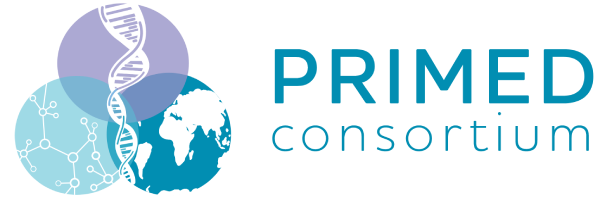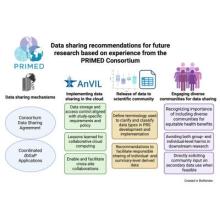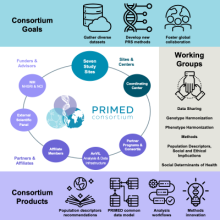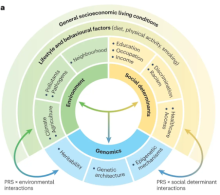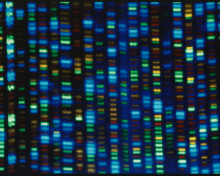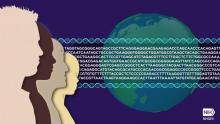PRIMED shares experience and policy recommendations for genomic data sharing
On July 7, the PRIMED Data Sharing Working Group’s Perspective was published in the American Journal of Human Genetics, describing consortium data sharing policies and procedures to bring together diverse global datasets, implementation of cloud-based data sharing in AnVIL, and experiences with public release of data derivatives. The Perspective also makes policy recommendations to inform future research and data sharing efforts.
PRIMED featured in NHGRI Director's newsletter
The PRIMED Perspective is featured in the January 2025 "The Genomics Landscape," a monthly newsletter from NHGRI Director Eric Green, M.D., Ph.D., featuring activities and accomplishments from the institute and the field of genomics. The Perspective outlines goals, approaches, and ongoing activities, including new PRS methods and models.
Publication of PRIMED Perspective in AJHG
The PRIMED Perspective manuscript has been published, viewable on the AJHG website and ScienceDirect. In brief, this Consortium marker paper describes the PRIMED Consortium and organization of its activities, and highlights methodological innovations and early products, with the goal of facilitating additional initiatives that aim to reduce inequity in genomic medicine.
PRIMED at ASHG 2024
We hope those attending the ASHG 2024 Annual Meeting in Denver, Colorado from November 5-9 check out the many PRIMED Consortium contributions! The Coordinating Center has put together a list of PRIMED posters, presentations, and other related events at ASHG 2024, which is also available on the PRIMED Consortium website's Abstracts page. Please also share with your colleagues and networks.
GenomeWeb highlights how the PRIMED Consortium is improving genetic risk estimates in diverse global populations
GenomeWeb spoke with PRIMED investigators for this article highlighting how PRIMED is improving genetic risk estimates in diverse global populations. The piece features contributions from Consortium members Iftikhar Kullo, James Meigs, Jaewon Choi, and Soo-Heon Kwak in advancing PRS for type 2 diabetes and cardiovascular disease.
Researchers roll out a more accurate way to estimate genetic risks of disease
PRIMED researchers from the FFAIRR-PRS Site have developed new methods to integrate multiple polygenic risk scores to produce more accurate predictions across diverse ancestries.
Principles and methods for transferring polygenic risk scores across global populations
Now out in Nature Reviews Genetics, this Review is a collaborative effort from the PRIMED Methods Review Working Group, led by Linda Kachuri, John Witte, and Tian Ge. This PRIMED Methods Working Group paper covers key methodological issues for polygenic risk scores (PRS) faced by the Consortium. It considers the genetic and non-genetic factors that impact PRS transferability across populations, with a focus on PRS construction methods for diverse ancestries and how future work can improve and increase the value of PRS.
Improving disease prediction in diverse populations
The UW will serve as the Coordinating Center for NIH's new new Polygenic Risk Score Diversity Consortium. NIH will fund consortium work through grants totaling $38 million over five years.
NIH awards $38 million to improve utility of polygenic risk scores in diverse populations
The NIH will fund grants totaling $38 million over five years to develop methods that will improve the way that polygenic risk scores can be used to predict disease in diverse communities.
